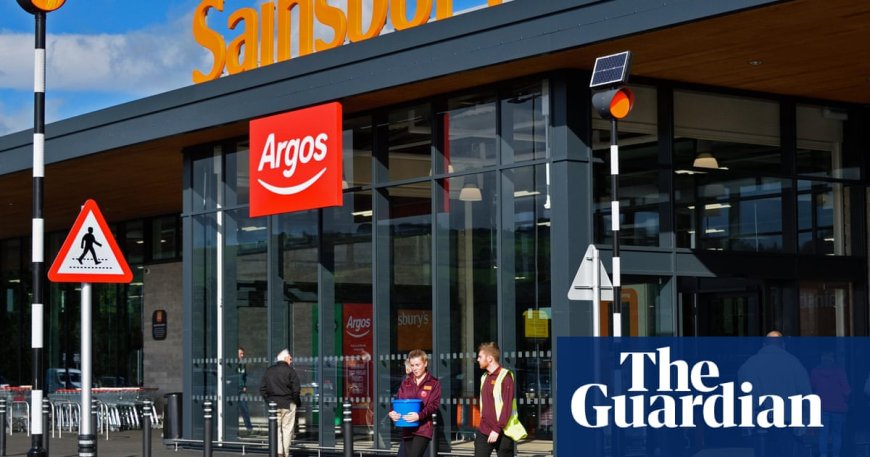Sainsbury’s CEO Cautions Against More Retail Taxes After National Insurance Hike
Sainsbury’s CEO warns the UK government about the impact of raising national insurance costs on retailers and jobs. The supermarket group faces extra costs this year due to tax changes, including a new packaging tax. Despite strong sales growth, the company remains cautious about further tax impacts.

The UK government should be wary of loading retailers with more tax after the 'high impact', particularly on jobs, of raising national insurance costs this year, the boss of Sainsbury’s has warned.
The chancellor, Rachel Reeves, is under pressure to raise fresh funds in her autumn budget as she attempts to fix public services and grow the economy while meeting her fiscal rules and dealing with the fallout from the government’s U-turn on welfare cuts.
'The government have got to be cautious about the amount of cost coming into the industry,' Simon Roberts, the chief executive of the supermarket group, said.
Retailers had warned since Rachel Reeves’s autumn budget that the chancellor’s £25bn increase in employer national insurance contributions and 6.7% national living wage rise, introduced from April, would force them to raise their prices.
As the government consults on raising the level of business rates levied on the largest retail properties, Roberts said the government had 'got to understand how unfair a tax business rates are' and 'why it impacts jobs'.
The changes to employers’ national insurance contributions, which were implemented in April, will cost Sainsbury’s £140m extra this year, while a new packaging tax is expected to cost £55m.
'In all our discussions we have got to make sure there isn’t any further tax impact on the system,' Roberts said.
His comments came as Sainsbury’s recorded its strongest growth since last summer partly thanks to a big step up in sales at the Argos chain as shoppers sought out paddling pools and fans during recent hot weather.
The retail group said Argos was able to achieve growth of 4.4% in the three months to 21 June, up from 1.9% in the previous quarter and its strongest growth in two years.
The group’s total sales rose 4.9%, helped by the strong trading at Argos and a rise in clothing sales as shoppers snapped up shorts and swimsuits, as well as healthy demand for its premium food ranges. That excludes fuel, where sales fell partly because of price decreases.
The retailer said it had achieved the strong sales despite a 'subdued, highly competitive and deflationary general merchandise market' as it booked rapid growth in online sales and via its app.
Sainsbury’s, the UK’s second biggest supermarket chain, said it had cut prices compared with all 'key competitors', including Asda and Tesco, as it was on track to cut £1bn in costs by March 2027. Costs were partly lowered by a shift to self-service tills and SmartShop handsets, with which shoppers scan goods in their basket on the go.
The figures indicate that Sainsbury’s is holding out against a wave of price cuts and improved service at Asda, the UK’s third largest supermarket chain, which aims to win back shoppers after more than a year of sales declines.
Aarin Chiekrie, an analyst at Hargreaves Lansdown, said Sainsbury’s had reached its highest market share in a decade despite Asda’s efforts at a fightback. 'While it’s still early in the group’s financial year, signs of an all-out price war among the major supermarkets hasn’t materialised,' he added.
However, the company did not upgrade profits expectations for the year – which are still expected to come in at about £1bn – hinting that Sainsbury’s was keeping fuel in the tank for further price cuts to come.
Roberts said there was 'a lot for this year still to play out' with inflation on some commodities such as beef and cocoa as well as the impact of tax rises.
'We have great momentum, growing faster than the market for three consecutive years and we are well set to deliver another strong performance over the summer. Boosted by a sunny spring, we’re already off to a great start,' he said.
The strong sales figures were helped by an increase in food inflation, which rose to 3.7% in June, up from 2.8% in May. The British Retail Consortium said hot weather, with temperatures close to record levels this month, was hitting harvest yields.
Roberts also admitted that Sainsbury’s had seen a small benefit from the cyber-attacks at Marks & Spencer and the Co-op which hit the availability of products in those stores for several weeks.
According to the source: The Guardian.
What's Your Reaction?
 Like
0
Like
0
 Dislike
0
Dislike
0
 Love
0
Love
0
 Funny
0
Funny
0
 Angry
0
Angry
0
 Sad
0
Sad
0
 Wow
0
Wow
0

















































































































































